#words of radiance discourse :)
Explore tagged Tumblr posts
Text
By the way, as a Words of Radiance original cut truther (Kaladin!!!!!!!!!!! Killed!!!!!!!!!! Szeth!!!!!!!!!!!!!!) I do unfortunately have to criticize how weak the retcon has made some of these interactions. Szeth going "I shouldn't dismiss him, he did defeat me after all, right before I died unrelatedly from natural causes." Nale going "you claim to care about him but you left him to die" so did you!!! You were also there Nale, you can fly, if he hadn't been literally stabbed to death by a shard weapon you could have saved him yourself!!!! Do not pretend that Nale would give a shit about Kaladin's inaction when they'd been trying to kill each other moments before.
Look, I love every interaction between this set of characters, now and forever, but think about how much stronger all these scenes would have been if Kaladin actually had killed Szeth, and that was hanging over his head the whole time.
#szeth#kaladin#words of radiance discourse :)#for those who don't know. at original time of publishing kaladin unequivocally killed szeth during their duel#but sanderson later grew uncomfortable with that and changed it to what you'll currently find in any later print of it#i read a copy from the original printing. i had no idea about the retcon until i started interacting with the fandom some years later#i kept making jokes about that one time when kaladin killed szeth and some people were a bit confused#poet sent me the revised version and i've been quietly seething ever since#should i put my liveblogging tag here? sure. why not.#basket's tag for reading stormlight 5; inevitably will contain spoilers (yes this is all part of the tag)#for those who sent asks i love you and i promise i will respond to all of them once i'm in front of a computer again
27 notes
·
View notes
Text
“The King was Dalinar’s Tien” in WoR is truly such a ???? line/ moment . That realization is given so much gravitas but it’s like actually what are you on about that makes no sense
#I feel like it’d be fine if Kaladin came to a conclusion of like “elhokar doesn’t need to die but he does need to be dethroned.”#that makes sense based on his upbringing and aversion to unnecessary killing#but The KING is DALINARS TIEN#“A door is a type of mug because they both have handles and paint” like no they just have exactly two things in common#has this discussion come and gone#Im always worried I’m rehashing some discourse that was 5 years old#but then Im like#it’s my blog#stormlight archive#words of radiance
330 notes
·
View notes
Text
Aphrodite in the Houses
paid readings | Masterlist
ᡣ𐭩 Please support me by reposting, liking, following me and commenting your aphrodite placement. The asteroid Aphrodite (1388), is a beautiful asteroid which explores the romance in oneself and how they appreciate the world around them.

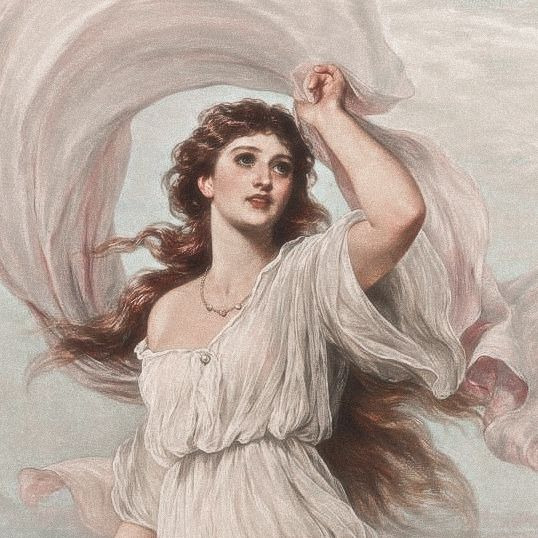

🐚 1st House A very sweet yet confident aura surrounds you when you walk into the room. There's an understanding that you know art and you know it well. Your taste is impecible and you have a cheeky grin on your face when you enter the room, which captivates everyone. Appearances mean alot to you, and that's reflected in your soul.
🐚 2nd House You have a very elgant throat and perhaps have some curves to your hips. This house is bathed in luxury and desire, you may want to hold onto your loved ones or items for dear life. As it may be rare for you to find something that rings thoes bells in your heart.
🐚 3rd House Your beauty sparkles with vivacity and grace, illuminated by your animated expressions and keen intellect. A youthful, luminous charm emanates from your every word and fleeting, radiant smile. In love, you weave a tapestry of wit and playful discourse, where conversation and subtle teasing kindle a romance that feels endlessly fresh and invigorating.
🐚 4th House Such tender and intimate, emanating a gentle warmth that evokes the sanctuary of home. The presence of someone being beside, holding you - may be the passage to your heart, or how you capture others'. You possess a soothing presence, offering love that is profoundly nurturing and quietly protective—a refuge where affection grows in tranquil intimacy.
🐚 5th House Your radiance is exuberant and theatrical, a luminous celebration of joy and creativity. You shine with a regal grace, captivating through passionate expression and playful allure. Music is your life and soul and i would recommend you dabble in the arts of some sort.Your romance is a vibrant performance, full of heartfelt grandeur and delightful spontaneity.
🐚 6th House Your beauty is understated and refined, manifesting in thoughtful gestures and meticulous care. There is an elegant simplicity in your devotion, expressed through gentle attentiveness and a gracious commitment to the everyday acts of love.
🐚 7th House Your elegance lies in balance and harmony, an exquisite blend of charm and diplomacy. You embody the art of partnership, radiating a serene beauty that fosters mutual respect and graceful connection. In love, you are a consummate collaborator, weaving unity and affection with delicate finesse.
🐚 8th House Your allure is profound and enigmatic, a magnetic depth that invites intimate exploration. There is an irresistible intensity in your gaze, revealing a soul both passionate and mysterious. Your love is transformative, a sacred intertwining of vulnerability and power.
🐚 9th House Your beauty is expansive and radiant, suffused with an adventurous spirit and intellectual curiosity. You captivate through an open-hearted enthusiasm and a boundless desire for growth. Your romance is a voyage of shared discovery, inspiring a love that transcends horizons.
🐚 10th House Your presence is stately and refined, an embodiment of grace fused with ambition. You possess a dignified beauty that commands respect and admiration. In love, you express yourself with poised sincerity, crafting relationships marked by honor, loyalty, and shared purpose.
🐚 11th House Your charm is unconventional and visionary, radiating originality and progressive ideals. You attract through a compelling uniqueness and a sincere commitment to collective dreams. Your romantic nature is both friendly and idealistic, cultivating bonds grounded in mutual inspiration.
🐚 12th House Your beauty is ethereal and elusive, an exquisite subtlety that enchants with quiet mystery. There is a profound spiritual grace in your presence, offering love that is tender, compassionate, and deeply intuitive—a sacred refuge of emotional depth and poetic longing.

DISCLAIMER: This post is a generalisation and may not resonate. I recommend you get a reading from an astrologer (me). If you want a reading from me check out my 🍨 sales page.
@astrofaeology private services 2025 all rights reserved
#astr#astro observations#astro community#astrology#astro notes#aphrodite 1388#aphrodite#asteroid aphrodite#beauty astrology#astrology notes#astrology readings#asteroids#asteroid
183 notes
·
View notes
Text
What is a woman’s place in this modern world? I rebel against this question, though so many of my peers ask it. The inherent bias in the inquiry seems invisible to so many of them. They consider themselves progressive because they are willing to challenge many of the assumptions of the past.
They ignore the greater assumption—that a “place” for women must be defined and set forth to begin with. Half of the population must somehow be reduced to the role arrived at by a single conversation. No matter how broad that role is, it will be—by nature—a reduction from the infinite variety that is womanhood.
I say that there is no role for women—there is, instead, a role for each woman, and she must make it for herself. For some, it will be the role of scholar; for others, it will be the role of wife. For some, it will be both. For yet others it will be neither.
Do not mistake me in assuming I value one woman’s role above another. My point is not to stratify our society—we have done that far too well already—my point is to diversify our discourse.
A woman’s strength should not be in her role, whatever she chooses it to be, but in the power to choose that role. It is amazing to me that I even have to make this point, as I see it as the very foundation of our conversation.
-Words of Radiance by Brandon Sanderson, Chapter 65
#Was happy to see this in a book written by a man#feminism#feminist#radical feminism#cosmere#cosmere quotes#Book quotes#literary quotes#literature#modern literature#fantasy#fiction#stromlight archive#branderson#brandon sanderson#the way of kings#words of radiance#oathbringer#rhythm of war#deep quotes#quote
34 notes
·
View notes
Text
When Brandon Sanderson and Jasnah Kholin send me on an unexpected journey.
I love how Brandon Sanderson creates complex worlds with rich and unique cultures totally unlike our own, like one filled with masculine vs feminine rolls and expectations that even influences your food, where men don’t read or write and sometimes notes are written that shouldn’t be read out loud so only those that can read know about them, and then he gives us this totally relatable rant by Jasnah Kholin:
“What is a woman's place in this modern world? Jasnah Kholin's words read. I rebel against this question, though so many of my peers ask it. The inherent bias in the inquiry seems invisible to so many of them. They consider themselves progressive because they are willing to challenge many of the assumptions of the past.
They ignore the greater assumption--that a 'place' for women must be defined and set forth to begin with. Half of the population must somehow be reduced to the role arrived at by a single conversation. No matter how broad that role is, it will be--by-nature--a reduction from the infinite variety that is womanhood.
I say that there is no role for women--there is, instead, a role for each woman, and she must make it for herself. For some, it will be the role of scholar; for others, it will be the role of wife. For others, it will be both. For yet others, it will be neither.
Do not mistake me in assuming I value one woman's role above another. My point is not to stratify our society--we have done that far to well already--my point is to diversify our discourse.
A woman's strength should not be in her role, whatever she chooses it to be, but in the power to choose that role. It is amazing to me that I even have to make this point, as I see it as the very foundation of our conversation.”
-Jasnah Kholin in Words of Radiance, chapter 65
Suddenly I was transported from this totally alien world and culture to flashing back to my own childhood and hearing:
“Girls can do anything boys can do!”
As a young girl, this positive, well meaning message, both inspired me and made me very aware that some people didn’t believe it and needed to be told. But I was too young at the time to understand the truth that girls weren’t being given the space to do what boys did. Still, that message, although a symptom and continuation of the bias, was sadly a much needed baby step in making progress and moving the bar a step closer to equality.
I know this is old news and gender rolls have been challenged and evolving for forever. I love seeing the continued progress, even when setbacks can be devastating. It’s hard to imagine that women have only had the right to vote for 104 years. And it took ver 50 years before women were allowed to open a bank account without their father or husband giving them permission. Women gained that right 6 years before I was born. No wonder I grew up having to be told that “girls could do anything boys could do”.
My children don’t get impacted by passages like the one in this book in the same way I do. And although they have continued to be impacted and struggle against the limits society has placed on gender, the messages they have received as a child have been different from mine, just as mine are different from those of my mother’s and grandmother’s generations. My wish is that someday this rant by Jasnah Kholin will feel like something completely un relatable.
#sometimes it feels good to see how far the conversation has come#I’m just rambling#and having feelings#stormlight archive#words of radiance#jasnah kholin#brandon sanderson#own post
11 notes
·
View notes
Text
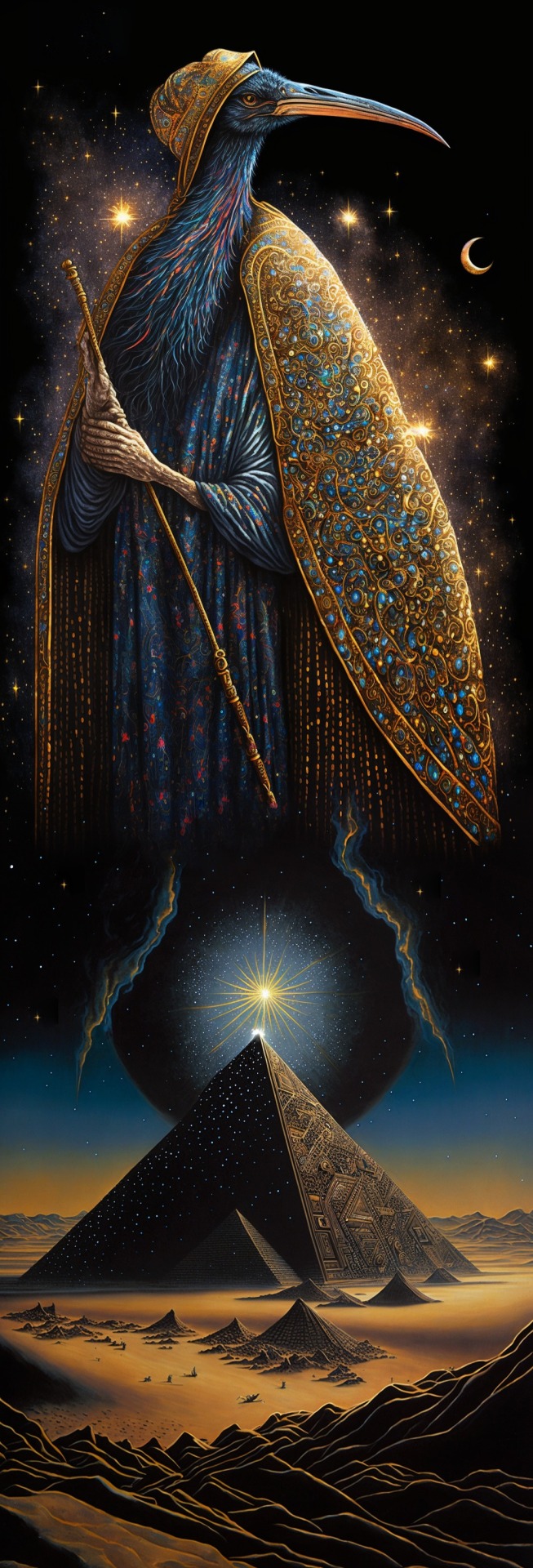
Thoth: The Atlantean Talon Abraxas
I, Thoth, the Atlantean,
give of my wisdom,
give of my knowledge,
give of my power.
Freely I give to the children of men.
Give that they, too, might have wisdom
to shine through the world from the veil of the night.
Wisdom is power and power is wisdom,
one with each other, perfecting the whole.
Be thou not proud, O man, in thy wisdom.
Discourse with the ignorant as well as the wise.
If one comes to thee full of knowledge,
listen and heed, for wisdom is all.
Keep thou not silent when evil is spoken for Truth
like the sunlight shines above all.
He who over-steppeth the Law shall be punished,
for only through Law comes the freedom of men.
Cause thou not fear for fear is a bondage,
a fetter that binds the darkness to men.
Follow thine heart during thy lifetime.
Do thou more than is commanded of thee.
When thou hast gained riches,
follow thou thine heart,
for all these are of no avail if
thine heart be weary.
Diminish thou not the time of
following thine heart.
It is abhorred of the soul.
They that are guided go not astray,
but they that are lost cannot find a straight path.
If thou go among men, make for thyself,
Love, the beginning and end of the heart.
If one cometh unto thee for council,
let him speak freely,
that the thing for which he hath
come to thee may be done.
If he hesitates to open his heart to thee,
it is because thou, the judge, doeth the wrong.
Repeat thou not extravagant speech,
neither listen thou to it,
for it is the utterance of one
not in equilibrium.
Speak thou not of it,
so that he before thee may know wisdom.
Silence is of great profit.
An abundance of speech profiteth nothing.
Exalt not thine heart above the children of men,
lest it be brought lower than the dust.
If thou be great among men,
be honoured for knowledge and gentleness.
If thou seeketh to know the nature of a friend,
ask not his companion,
but pass a time alone with him.
Debate with him,
testing his heart by his words and his bearing.
That which goeth into the store-house must come forth,
and the things that are thine must be shared with a friend.
Knowledge is regarded by the fool as ignorance,
and the things that are profitable are to him hurtful.
He liveth in death.
It is therefore his food.
The wise man lets his heart overflow
but keeps silent his mouth.
O man, list to the voice of wisdom;
list to the voice of light.
Mysteries there are in the Cosmos
that unveiled fill the world with their light.
Let he who would be free from the bonds of darkness
first divine the material from the immaterial,
the fire from the earth;
for know ye that as earth descends to earth,
so also fire ascends unto
fire and becomes one with fire.
He who knows the fire that is within
himself shall ascend unto the eternal fire
and dwell in it eternally.
Fire, the inner fire,
is the most potent of all force,
for it overcometh all things and
penetrates to all things of the Earth.
Man supports himself only on that which resists.
So Earth must resist man else he existeth not.
All eyes do not see with the same vision,
for to one an object appears of
one form and color
and to a different eye of another.
So also the infinite fire,
changing from color to color,
is never the same from day to day.
Thus, speak I, THOTH, of my wisdom,
for a man is a fire burning bright
through the night;
never is quenched in the veil of the darkness,
never is quenched by the veil of the night.
Into men's hearts, I looked by my wisdom,
found them not free from the bondage of strife.
Free from the toils, thy fire, O my brother,
lest it be buried in the shadow of night!
Hark ye, O man, and list to this wisdom:
where do name and form cease?
Only in consciousness, invisible,
an infinite force of radiance bright.
The forms that ye create by brightening
they vision are truly effects that follow thy cause.
Man is a star bound to a body,
until in the end,
he is freed through his strife.
Only by struggle and toiling thy
utmost shall the star within thee
bloom out in new life.
He who knows the commencement of all things,
free is his star from the realm of night.
Remember, O man, that all which exists
is only another form of that which exists not.
Everything that has being is passing into yet other
being and thou thyself are not an exception.
Consider the Law, for all is Law.
Seek not that which is not of the Law,
for such exists only in the illusions of the senses.
Wisdom cometh to all her children
even as they cometh unto wisdom.
All through the ages,
the light has been hidden.
Awake, O man, and be wise.
Deep in the mysteries of life have I traveled,
seeking and searching for that which is hidden.
List ye, O man, and be wise.
Far 'neath the earth crust,
in the Halls of Amenti,
mysteries I saw that are hidden from men.
Oft have I journeyed the deep hidden passage,
looked on the Light that is Life among men.
There 'neath the flowers of Life ever living,
searched I the hearts and the secrets of men.
Found I that man is but living in darkness,
light of the great fire is hidden within.
Before the Lords of hidden Amenti
learned I the wisdom I give unto men.
Masters are they of the great Secret Wisdom,
brought from the future of infinity's end.
Seven are they, the Lords of Amenti,
overlords they of the Children of Morning,
Suns of the Cycles, Masters of Wisdom.
Formed are not they as the children of men?
THREE, FOUR, FIVE AND SIX, SEVEN,
EIGHT, NINE are the titles of the Masters of men.
Far from the future, formless yet forming,
came they as teachers for the children of men.
Live they forever, yet not of the living,
bound not to life and yet free from death.
Rule they forever with infinite wisdom,
bound yet not bound to the dark Halls of Death.
Life they have in them, yet life that is not life,
free from all are the Lords of the ALL.
Forth from them came forth the Logos,
instruments they of the power o'er all.
Vast is their countenance,
yet hidden in smallness,
formed by a forming, known yet unknown.
THREE holds the key of all hidden magic,
creator he of the halls of the Dead;
sending forth power, shrouding with darkness,
binding the souls of the children of men;
sending the darkness, binding the soul force;
director of negative to the children of men.
FOUR is he who looses the power.
Lord, he, of Life to the children of men.
Light is his body, flame is his countenance;
freer of souls to the children of men.
FIVE is the master, the Lord of all magic -
Key to The Word that resounds among men.
SIX is the Lord of Light, the hidden pathway,
path of the souls of the children of men.
SEVEN is he who is Lord of the vastness,
master of Space and the key of the Times.
EIGHT is he who orders the progress;
weighs and balances the journey of men.
NINE is the father, vast he of countenance,
forming and changing from out of the formless.
Meditate on the symbols I give thee.
Keys are they, though hidden from men.
Reach ever upward, O Soul of the morning.
Turn thy thoughts upward to Light and to Life.
Find in the keys of the numbers I bring thee,
light on the pathway from life unto life.
Seek ye with wisdom.
Turn thy thoughts inward.
Close not thy mind to the flower of Light.
Place in thy body a thought-formed picture.
Think of the numbers that lead thee to Life.
Clear is the pathway to he who has wisdom.
Open the door to the Kingdom of Light.
Pour forth thy flame as a Sun of the morning.
Shut out the darkness and live in the day.
Take thee, O man! As part of thy being,
the Seven who are but are not as they seem.
Opened, O man! Have I my wisdom.
Follow the path in the way I have led.
Masters of Wisdom,
SUN of the MORNING LIGHT and LIFE
to the children of men.
--The Key of Wisdom
The Emerald Tablets of Thoth
64 notes
·
View notes
Text
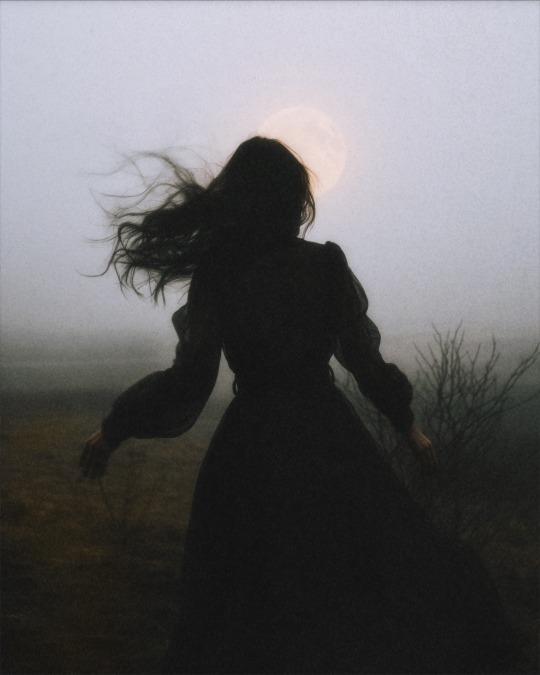
In the quietude of my chamber, I find myself pondering upon the phases of the moon, that mysterious orb that waxes and wanes in the vast expanse of the sky. As I trace the silvery journey of Luna through her cyclical metamorphosis, I discern a reflection of my own mutable existence, an existence once shrouded in the dusky veils of uncertainty and ignorance. There were periods when my soul, like the crescent moon, stood in partial illumination, revealing only fragments of its true essence. Shadows draped my spirit, and I walked a path scattered with the debris of my own missteps. With each passing phase and passage of time, I delve deeper into the labyrinthine corridors of my own being. On this pilgriamge in the realm of introspection, words become inadequate companions. The soul, weary of the trivial discourse, seeks solace in the profound silence of self-reflection. Through the darkened hours of my mistakes and loss, I became a beacon, not of flawlessness, but of resilience. The past, like the waning moon, retreats into the obscurity of memory, making way for the burgeoning radiance of a new self. It is a communion with the divine, where the essence of the self converges with the cosmic energies that govern the celestial dance. Amidst the celestial dance of the moon phases, I, too, have evolved—a woman transformed, imperfect yet profound, in the perennial journey of becoming. 🌙
Photography by Crystal Lee Lucas (2023)
#crystal lee lucas#photography#dark art photography#photooftheday#other realms#dreamcore#dream pop#the moon#full moon#a trip to the moon
46 notes
·
View notes
Text
Chapter 4
Burdens of a Host
XXIX. A teeming of flowers surrounding the small enclosure, All vibrant and lush, ranging from yellow to blue, to white; And circled with short walls of stone, lit up by lantern’s light. Ríona found some little joy in her solitude, as the azure Hue of flow warmed her vexed cheeks. Youthful still, but wise enough To know when to call a day. She found her life to be so rough, Despite all the attainable commodities from over The seas. She had stormed off and began to retain her composure.
XXX. Continuing her preoccupied gaze at a blue flower, Noting the chrysanth’s growing bud, and the faint, fragrant smell That emanated outwards, marked Young Cutter’s coming spell Of youth – of love and growth, as the winter’s drought it would shower With downpours of torrential rain, and perchance the gods would gift Her town with boons of abundance. The folk’s demeanour would shift T’wards radiance and dance, and festivities of the late hour. Soon even the songbirds will her cherished seclusion sour.
XXXI. Reflecting upon those events from a few moments ago, Ríona thought the goddess found the whole ordeal bizarre, But ask her, she would not. The two souls had been keeping far Away from one another ever since the two had a row. No doubt her father was still scornful, but it mattered not To her, for she saw it all differently, yet still, she fought Back any guilt that could creep into her, fester and grow. The question of history irked her mind, and answers were slow.
XXXII. Indeed, the solitude that circled her was flawed, she felt The presence of the Goddess always there, always close by Her own soul. This time she marked her luck, the spirit did not pry. To say she hated her would be unjust, such cards were dealt To her before she entered the game of life and besides, To say and imply Aurianne is not one who Ríona guides, Especially, with a motherly caress which calmed and melt Away all sorrows. Such were now the skills under her belt.
XXXIII. Gazing into her rational mind’s space, she found her sense. To mock the coming warmth of spring would be of little aid, And from whence this thought came bemused her. Was she being swayed By the goddess’ intrusion again? Shaking her head in suspense, Before inquiring inwardly: “Listen’st thee? Of course, thou art… Why would’st thou not be?” She muttered, hoping discourse would finally start. Yet still, no voice answered. The goddess toying at her expense, Beckoning her to speak her mind, and let this game commence.
XXXIV. She let out another breath, straightened up and said with a tone Displeased: “I have scoured each of the libraries of Kaés, I’ve pored o’er each and every book of the celestial press, I’ve studied under scholars who’ve picked it clean as a bone! Yet… not one know’st thy past. Thou art an enigma to me All whilst share we a body whole, all whilst share’st not thee Thy story, knowing mine full well. Astounding! Thy well-known Titles all hold true, at the least!” She ended with a groan.
XXXV. The silence now became shrouded in utter fragility And slowly in the corner of her eye, Ríona saw a mass Of phantasmal nature take form stepping onto the grass From behind one of the stony pillars, draped in antipathy: “Thou art vile and sharp with words, indeed, though rarely dost thee bite! Thy demeanour of recency’s breath…” the goddess blunt in her slight: “Impulsive, Quarrelsome! Disobedient… Futility Of all this; the worst of traits – Rebellious thy symphony!”
XXXVI. Contempt now simmered betwixt the pair as tensions grew and grew, And Aurianne’s demeanour, sharp as ever, knew precisely How to cut deepest; still tenderness’ touch could put it lightly. Thus, the blaring silence was brought to a close long overdue: “Mute for three phases of the moon yet seeks answers on a plate! Indeed, reminds me of another…” her tone did not berate. “Thou shouldn’t be so ‘lone in thy turbulence and turn to Such scholar work – though impressive. Alas, a fated avenue!”
XXXVII. In ire Ríona scoffed and crossed her arms, looked away So the goddess would not be in the periphery of her gaze, Then muttered in defeat: “You never answer a simple phrase T’wards me directly… You meander, you plot, you convey Through sheer allegory! Why can’st nothing be simple with thee?” Aurianne took a deep breath and drew nearer: “One day will see Thee witness beyond the dark when I shall all my secrets betray! For now, perhaps through a truthful tale, let me thy fears allay.”

13 notes
·
View notes
Note
choose violence ask game. hollow knight
hi nonnie!!! unfortunately the last time i was super into HK was 2021 but i will try.
the character everyone gets wrong: lurien. he gets watered down into a pk fanboy almost every time i see him.
a compelling argument for why your fave would never top or bottom: never ever thought about this, never ever will
screenshot or description of the worst take you've seen on tumblr: not going to go into detail bc everyone's moved on and it was bad but it was a lot of weird discourse that happened a couple years back
what was the last straw that made you finally block that annoying person?: discourse.
worst discord server and why: this is personal beef, but the daily HK server that imploded from surpassing the Users Prone To Discourse threshold in horrific flaming fashion. it's been literally almost 3 years though so we're all good.
which ship fans are the most annoying?: anything with grimm. terribly sorry this is not a particularly romance-inclined fandom and i cannot think about them being in love in canon
what character did you begin to hate not because of canon but because how how the fandom acts about them?: grimm. sorry.
common fandom opinion that everyone is wrong about: I haven't been keeping up with this fandom at all lately so i really dont know WJBDEJDBEN HAHA
worst part of canon: there's nothing i really don't like about the game :D
worst part of fanon: I don't reaaaally like the intense babying of pv and ghost in post canon "everyone lived" fics. let them have agency man.
number of fandom-related words you've filtered: none!!!
the unpopular character that you actually like and why more people should like them: lurien!!! this is because i briefly ran an rp blog as him, but also because i think it's interesting to think about what would've brought a character like him to be so devoted to pk's cause, and what kind of person he was when hollownest was in the prime of its life. funny towel man.
worst blorboficiation: grimm. SORRY SORRY SORRY
that one thing you see in fics all the time: strangely contrived prose to refer to the body language of all the characters. i get it but Why
that one thing you see in fanart all the time: ghost being drawn with other indie protags. little baby is officia delegate of hollow knight.
you can't understand why so many people like this thing (characterization, trope, headcanon, etc): everyone loves memeing on pale king as being a guy willing to kill his own babies to save his kingdom but i genuinely want some exploration of him beyond just a surface level flanderizing "lol. lmao he threw his kids off a cliff" joke. Hupis Incarnate
there should be more of this type of fic/art: i love gijinkas/humanizations esp modern day gijinkas never stop making gijinka content. also anything to do with the radiance. i love the radiance.
it's absolutely criminal that the fandom has been sleeping on...: CORNIFER AND ISELDA AND THE FIVE KNIGHTS AND (hk fixation kicks back in 2 years layer)
you're mad/ashamed/horrified you actually kind of like...: lace/hornet. we don't even know the BACKSTORY. but do you think yuri can bloom on the battlefield.
part of canon you found tedious or boring: actually have never played HK lol
part of canon you think is overhyped: like 40% of the grimm troupe expansion. it's cool but the fanbase latched on too hard.
your favorite part of canon that everyone else ignores: KINGDOM'S EDGE AND EVERYTHING ABOUT MONOMON AND THE SIMPLE FRAMING OF THE INSTRUCTIONS AS BEING FOR HIGHER BEINGS. LIKE WHAT THE FUCK.
ship you've unwillingly come around to: lemmquirrel, i see it and im like "neat! middle aged bug yaoi and the aimlessness of a quest to reacquaint yourself with purpose! i haven't read sbabl ever!"
topic that brings up the most rancid discourse: (stares at camera) Shipping.
common fandom complaint that you're sick of hearing: when silksong (me too. but give them some time.)
#natto blabbos#natto answers#ask#anon#ask meme#ask game#hollow knight#long post#send me any hk meta you find if you want!!! i still do love this game but it's taken a backseat to Everything
8 notes
·
View notes
Text

Exploring Ösel: Clarity, Luminosity, and Reflexive Apperception in Vajrayana and Bon
In the Shangpa tradition’s collections of the early masters’ life stories, Kunga Ö’s Biography of the Wisdom Dakini Niguma covers a mere six pages, most of which amount to verses of praise. Only the following words are pertinent to her life:
This wisdom dakini was born the daughter of the great Brahmin Shantivarma [Zhiwé Gocha] and the Brahmini Shrimati [Palgyi Lodrö]. Her name was Shrijnana [Palgyi Yéshé]. She was pandit Naropa’s sister and a member of the Brahmin caste. During three previous incalculable eons of time, she actualized her training on the spiritual path.
In the continuity of that path, during this lifetime she received a little instruction from a few accomplished spiritual masters and, based on their teaching, directly saw the truth of the nature of reality. Her illusory body of obscuring emotions appeared as a pure body of enlightenment. Having reached awakening’s three pure stages, she actually met the great Buddha Vajra Bearer [Dorje Chang, Tib, Vajradhara. Sanskrit] and received from him the full four empowerments of Great Way tantra within an emanated sacred circle of deities.
The wisdom of her understanding of every sacred teaching, such as Buddha’s discourses and tantras, profound instructions, and treatises, flowered to include direct [knowledge and sight] of the nature and multiplicity of all phenomena. She reached awakening’s tenth stage, Cloud of the Doctrine.
Her obscurations of knowledge became finer and finer until no veils remained; she became one with enlightenment, an epitome of the three bodies of enlightenment. She reached perfection in renunciation and realization, the achievement of her own goal. Her enlightenment’s two form bodies appear for the benefit of others until the end of existence and bring benefit to beings in ways that can purposefully guide them. In åparticular, she watches over those who preserve her lineage with a compassion that knows no distance; she blesses them and ensures the success of their enlightened activity.
The Collection of Shangpa Masters’ Biographies, pp. 40-42
Ösel, often translated as "Radiant Light" or "Inner Radiance," is a profound concept and practice deeply rooted in Vajrayana and Bon traditions. This essay aims to delve into the intricacies of Ösel, its significance, and its various aspects. We will explore its meaning, the practices associated with it, its place in the Six Yogas of Naropa and the Six Yogas of Niguma, as well as its connection to rang rigpa or "reflexive apperception." Additionally, we will discuss the nomenclature, orthography, and etymology of this term.
1. Ösel: Meaning and Significance
- Ösel, derived from Sanskrit prabhasvara, refers to "Clarity" or "Luminosity." It symbolizes the intrinsic purity of the mindstream.
- It represents a state of luminous clarity that practitioners aspire to attain, highlighting the radiant nature of the mind.
2. Ösel as a Sādhanā
- Ösel is a fundamental practice in Vajrayana and Bon traditions. It serves as a sādhanā, a spiritual path or method.
- The sādhanā of Ösel focuses on realizing and experiencing the innate luminosity and clarity of the mind.
3. Variations and Derivatives
- Ösel has evolved over time, resulting in numerous versions, derivatives, and accretions of the sādhanā.
- Different lineages and schools may have their own interpretations and practices related to Ösel.
4. Ösel in the Six Yogas
- Ösel is typically included among the Six Yogas of Naropa, a set of advanced tantric practices.
- It is also part of the Six Yogas of Niguma, a sister tradition, emphasizing its significance in Tibetan Buddhism.
5. Ösel and Rang Rigpa
- Ösel is not merely a practice but an experience of rang rigpa or "reflexive apperception."
- Rang rigpa involves the direct recognition of the nature of mind, which is often described as pristine awareness.
6. Nomenclature, Orthography, and Etymology
- The translation of Ösel into English as "Inner Radiance" reflects an attempt to capture its essence.
- Understanding the technical terms and their origins is crucial for a comprehensive grasp of Ösel.
Ösel, with its deep-rooted significance in Vajrayana and Bon traditions, represents the pursuit of clarity and luminosity within the mindstream. As a sādhanā, it guides practitioners towards experiencing the radiant nature of their own consciousness. Its inclusion in the Six Yogas of Naropa and the Six Yogas of Niguma underscores its importance in Tibetan Buddhism. Moreover, Ösel's connection to rang rigpa emphasizes the direct recognition of the mind's pristine awareness. While its nomenclature and orthography may vary, the essence of Ösel remains a beacon of inner radiance for spiritual seekers in these traditions. Exploring Ösel offers a profound journey into the depths of consciousness and self-realization.
2 notes
·
View notes
Text

24th August >> Mass Readings (USA)
Feast of Saint Bartholomew, Apostle
(Liturgical Colour: Red: A (1))
First Reading Revelation 21:9b-14 On the foundation of the city were inscribed the names of the twelve Apostles of the Lamb.
The angel spoke to me, saying, “Come here. I will show you the bride, the wife of the Lamb.” He took me in spirit to a great, high mountain and showed me the holy city Jerusalem coming down out of heaven from God. It gleamed with the splendor of God. Its radiance was like that of a precious stone, like jasper, clear as crystal. It had a massive, high wall, with twelve gates where twelve angels were stationed and on which names were inscribed, the names of the twelve tribes of the children of Israel. There were three gates facing east, three north, three south, and three west. The wall of the city had twelve courses of stones as its foundation, on which were inscribed the twelve names of the twelve Apostles of the Lamb.
The Word of the Lord
R/ Thanks be to God.
Responsorial Psalm Psalm 145:10-11, 12-13, 17-18
R/ Your friends make known, O Lord, the glorious splendor of your Kingdom.
Let all your works give you thanks, O LORD, and let your faithful ones bless you. Let them discourse of the glory of your Kingdom and speak of your might.
R/ Your friends make known, O Lord, the glorious splendor of your Kingdom.
Making known to men your might and the glorious splendor of your Kingdom. Your Kingdom is a Kingdom for all ages, and your dominion endures through all generations.
R/ Your friends make known, O Lord, the glorious splendor of your Kingdom.
The LORD is just in all his ways and holy in all his works. The LORD is near to all who call upon him, to all who call upon him in truth.
R/ Your friends make known, O Lord, the glorious splendor of your Kingdom.
Gospel Acclamation John 1:49b
Alleluia, alleluia. Rabbi, you are the Son of God; you are the King of Israel. Alleluia, alleluia.
Gospel John 1:45-51 Here is a true child of Israel. There is no duplicity in him.
Philip found Nathanael and told him, “We have found the one about whom Moses wrote in the law, and also the prophets, Jesus son of Joseph, from Nazareth.” But Nathanael said to him, “Can anything good come from Nazareth?” Philip said to him, “Come and see.” Jesus saw Nathanael coming toward him and said of him, “Here is a true child of Israel. There is no duplicity in him.” Nathanael said to him, “How do you know me?” Jesus answered and said to him, “Before Philip called you, I saw you under the fig tree.” Nathanael answered him, “Rabbi, you are the Son of God; you are the King of Israel.” Jesus answered and said to him, “Do you believe because I told you that I saw you under the fig tree? You will see greater things than this.” And he said to him, “Amen, amen, I say to you, you will see heaven opened and the angels of God ascending and descending on the Son of Man.”
The Gospel of the Lord
R/ Praise to you, Lord Jesus Christ.
4 notes
·
View notes
Text
The Stormlight Archive said something like this too, I think in one of Shallan's flashbacks.
“What is a woman's place in this modern world? Jasnah Kholin's words read. I rebel against this question, though so many of my peers ask it. The inherent bias in the inquiry seems invisible to so many of them. They consider themselves progressive because they are willing to challenge many of the assumptions of the past.
They ignore the greater assumption--that a 'place' for women must be defined and set forth to begin with. Half of the population must somehow be reduced to the role arrived at by a single conversation. No matter how broad that role is, it will be--by-nature--a reduction from the infinite variety that is womanhood.
I say that there is no role for women--there is, instead, a role for each woman, and she must make it for herself. For some, it will be the role of scholar; for others, it will be the role of wife. For others, it will be both. For yet others, it will be neither.
Do not mistake me in assuming I value one woman's role above another. My point is not to stratify our society--we have done that far to well already--my point is to diversify our discourse.
A woman's strength should not be in her role, whatever she chooses it to be, but in the power to choose that role. It is amazing to me that I even have to make this point, as I see it as the very foundation of our conversation.” ― Brandon Sanderson, Words of Radiance
i think what bothers me about a lot of "girl power" narratives is that they function on the implicit idea on the idea that women can become worthy of respect. and i happen to think that really caring about women means believing they already are worthy of respect. that historical seamstresses and soccer moms and forgotten sisters and sweet polite little girls and someone's weird grandma matter just as much as the warriors and politicians, even if they, personally, never accomplish anything "cool."
37K notes
·
View notes
Text
"The Moonlight." Introduction to Surah 54, Al-Qamar, "The Camera."

In Arabic, "qamar" (قمر) means "moon". It can also refer to moonlight, natural satellite, or be used as a unisex name meaning "moon" or "moonlight". The word "qamar" is often associated with beauty and mystery. We just finished a Surah named after the stars of sentience, now we move on to another celestial obiect in the same genre the moon. I have named the Surah after the Hebrew banner in order to focus on something of great importance to the current history of the human race called an Uhuru, "the freedom of the light."
So long as we are satellites to the God called Allah, we are free. If we wander from His Umrah, we face the penalty of the restrictions of the consequences of our wicked ambitions:
بِسْمِ اللَّهِ الرَّحْمَـٰنِ الرَّحِيمِ
On Freedom and Restriction in the Light of the Qur'an
Praise be to Allah, the One who created the heavens and the earth in truth, and placed within them balance and measure, that mankind may not transgress the limits. He is the One who fashioned the soul and inspired it with its wickedness and its righteousness (Qur’an 91:7–8), and He gave man the freedom to choose his path—to rise or to fall.
The concept of uhuru, though not uttered in the Arabic tongue, finds its meaning deeply embedded in the Divine Discourse. For freedom, as Allah teaches, is not the indulgence of every desire nor the absence of guidance. Rather, true freedom is emancipation from the tyranny of the lower self (nafs), from servitude to created things, and from the illusions of worldly pride. It is the liberation of the heart from shirk (idolatry), from injustice, and from despair.
"There is no compulsion in religion; truth has become distinct from falsehood." (Qur’an 2:256) Here, Allah asserts the dignity of human agency. Though He is fully capable of compelling belief, He dignifies man with choice, so that belief is sincere and the reward, deserved.
But this freedom is not without form. It exists within the bounds of Divine mercy, for absolute freedom leads to chaos, as fire without a hearth consumes all. Hence, the Qur’an also reveals the ḥudūd—the sacred boundaries set by Allah:
"These are the limits set by Allah, so do not transgress them. And whoever transgresses the limits of Allah—it is they who are the wrongdoers." (Qur’an 2:229)
Restriction in the Qur'an is not punishment, but discipline for the soul, like the fence that guards a garden from being trampled. The commandments—to pray, to fast, to give charity, to avoid what is impure—are the architecture of spiritual freedom. For what is greater bondage than addiction to the fleeting, or enslavement to the judgment of others?
The Prophet ﷺ was sent as a liberator, not merely of lands, but of hearts:
"He relieves them of their burden and the shackles that were upon them." (Qur’an 7:157) Ibn ‘Ashur comments that these shackles were both external laws imposed by corrupt rulers and internal burdens of guilt, shame, and confusion.
Thus, uhuru in Islam is the soul's return to its fitrah—its original nature—unshackled by the lies of dunya and reoriented to the light of tawḥīd. And restriction is not a prison, but a pathway, for Allah says:
"Say, [O Prophet], ‘Indeed, my Lord has guided me to a straight path...’" (Qur’an 6:161)
In Conclusion: Freedom in the Qur’an is not the breaking of all bonds, but the breaking of false ones. Restriction is not a denial of life, but its refinement—so that man may live nobly, justly, and in peace with himself and his Creator. Between the two lies the dance of choice, and in that, the meaning of life.
وَاللَّهُ أَعْلَمُ
With this concept of Uhuru in mind, let us begin the Surah and use the light in whose radiance we live to take a snapshot of our lives:
54: 1-6:
"The Hour has drawn near and the moon was split ˹in two˺.1
Yet, whenever they see a sign, they turn away,1 saying, “Same old magic!”
They rejected ˹the truth˺ and followed their own desires—and every matter will be settled—
even though the stories ˹of destroyed nations˺ that have already come to them are a sufficient deterrent.
˹This Quran is˺ profound ˹in˺ wisdom, but warnings are of no benefit ˹to them˺.
So turn away from them ˹O Prophet˺. ˹And wait for˺ the Day ˹when˺ the caller1 will summon ˹them˺ for something horrifying.2"
Commentary:
Freedom and restriction these are the two ways the light of the moon is split. If we follow the course, the Umrah, we find the light. If we go our own way, the nations will be plunged into darkness. Muhammad said non-discrimination regarding the moonlight was a desire for "something horrifying." He warns there has been sufficient warning for this, take a look at the pictures and you will see.
The Surah will continue.
0 notes
Text
Sloterdijk on Religiosity
pg. 23-25 You Must Change Your Life
A completely different aspect, however, the thoroughly incommensurable one, lies in the imposition of accepting that [the statute of Apollo’s torso from Rilke’s poem*] sees me while I observe it - indeed, that it eyes me more sharply than I can look at it.
The ability to perform the inner gesture with which one makes space for this improbability inside oneself most probably consists precisely in the talent that Max Weber denied having. This talent is ‘religiosity’, understood as an innate disposition and a talent that can be developed, making it comparable to musicality. One can practise it, just as one practises melodic passages or syntactic patterns. In this sense, religiosity is congruent with a certain grammatical promiscuity. Where it operates, objects elastically exchange places with subjects.
Therefore, if I accept that there are - on the shimmering surface of the mutilated stone [the statute] - numerous 'places' that amount to eyes and see me, I am performing an operation with a micro-religious quality - and which, once understood, one will recognize at all levels of macro-religiously developed systems as the primary module of a 'pious' inner action. In the position where the object usually appears, never looking back because it is an object, I now recognize a subject with the ability to look and return gazes. Thus, as a hypothetical believer, I accept the insinuation of a subject that dwells inside the respective place, and wait to see what this pliable development will make of me.
(We note: even the 'deepest' or most virtuosic piety cannot achieve more than habitualized insinuations.) I receive the reward for my willingness to participate in the object-subject reversal in the form of a private illumination - in the present case, as an aesthetic movedness.
The torso, which has no place that does not see me, likewise does not impose itself - it exposes itself. It exposes itself by testing whether I will recognize it as a seer. Acknowledging it as a seer essentially means ‘believing' in it, where believing, as noted above, refers to the inner operations that are necessary to conceive of the vital principle in the stone as a sender of discrete addressed energies. If I somehow succeed in this, I am also able to take the glow of subjectivity away from the stone. I tentatively accept the way it stands there in exemplary radiance, and receive the starlike eruption of its surplus of authority and soul.
…A few years earlier, he had written of Rodin's sculptures that there were endless places, and none of them did not have something happening in them’. Each place is a point at which Apollo, the god of forms and surfaces, makes a visually intense and haptically palpable compromise with his older opponent Dionysus, the god of urges and currents. That this energized Apollo embodies a manifestation of Dionysus is indicated by the statement that the stone glistens ‘like wild beasts' fur': Rilke had read his Nietzsche. Here we encounter the second micro-religious or proto-musical module: the notorious 'this stands for that', 'the one appears in the other' or 'the deep layer is present in the surface' - figures without which no religious discourse would ever have come about. They tell us that religiosity is a form of hermeneutical flexibility and can be trained.
‘For there is no place / that does not see you. You must change your life.' It remains to be shown why the second sentence, which seemingly requires no interpretation, is actually far more enigmatic than the first. It is not only its lack of preparation, its suddenness that is mysterious. 'You must change your life - these words seem to come from a sphere in which no objections can be raised. Nor can we establish from where they are spoken; only their verticality is beyond doubt. It is unclear whether this dictum shoots straight up from the ground to stand in my way like a pillar, or falls from the sky to transform the road before me into an abyss, such that my next step should already belong to the changed life that has been demanded. It is not enough to say that Rilke retranslated ethics in an aestheticizing fashion into a succinct, cyclopian, archaic-brutal form. He discovered a stone that embodies the torso of 'religion', ethics and asceticism as such: a construct that exudes a call from above, reduced to the pure command, the unconditional instruction, the illuminated utterance of being that can be understood - and which only speaks in the imperative.
Rilke’s poem:
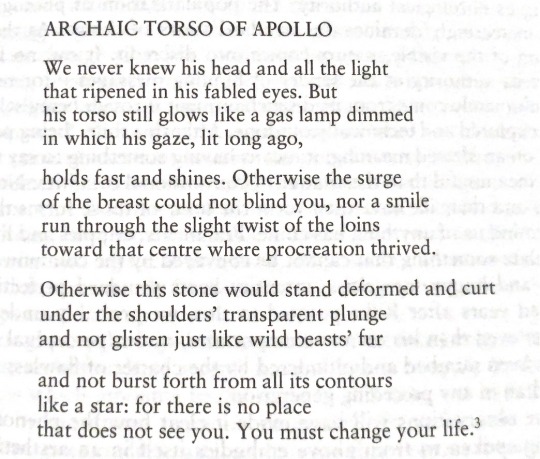
0 notes
Text
DAILY SCRIPTURE READINGS (DSR) 📚 Group, Fri Aug 23rd, 2024 ... Friday of The Twentieth Week in Ordinary Time, Year B/Feast of Saint Bartholomew, Apostle
Reading 1
----------
Rv 21:9b-14
The angel spoke to me, saying,
"Come here.
I will show you the bride, the wife of the Lamb."
He took me in spirit to a great, high mountain
and showed me the holy city Jerusalem
coming down out of heaven from God.
It gleamed with the splendor of God.
Its radiance was like that of a precious stone,
like jasper, clear as crystal.
It had a massive, high wall,
with twelve gates where twelve angels were stationed
and on which names were inscribed,
the names of the twelve tribes of the children of Israel.
There were three gates facing east,
three north, three south, and three west.
The wall of the city had twelve courses of stones as its foundation,
on which were inscribed the twelve names
of the twelve Apostles of the Lamb.
Responsorial Psalm
---------------
Ps 145:10-11, 12-13, 17-18
R. (12) Your friends make known, O Lord, the glorious splendor of your Kingdom.
Let all your works give you thanks, O LORD,
and let your faithful ones bless you.
Let them discourse of the glory of your Kingdom
and speak of your might.
R. Your friends make known, O Lord, the glorious splendor of your Kingdom.
Making known to men your might
and the glorious splendor of your Kingdom.
Your Kingdom is a Kingdom for all ages,
and your dominion endures through all generations.
R. Your friends make known, O Lord, the glorious splendor of your Kingdom.
The LORD is just in all his ways
and holy in all his works.
The LORD is near to all who call upon him,
to all who call upon him in truth.
R. Your friends make known, O Lord, the glorious splendor of your Kingdom.
Alleluia
-------
Jn 1:49b
R. Alleluia, alleluia.
Rabbi, you are the Son of God;
you are the King of Israel.
R. Alleluia, alleluia.
Gospel
--------
Jn 1:45-51
Philip found Nathanael and told him,
"We have found the one about whom Moses wrote in the law,
and also the prophets, Jesus son of Joseph, from Nazareth."
But Nathanael said to him,
"Can anything good come from Nazareth?"
Philip said to him, "Come and see."
Jesus saw Nathanael coming toward him and said of him,
"Here is a true child of Israel.
There is no duplicity in him."
Nathanael said to him, "How do you know me?"
Jesus answered and said to him,
"Before Philip called you, I saw you under the fig tree."
Nathanael answered him,
"Rabbi, you are the Son of God; you are the King of Israel."
Jesus answered and said to him,
"Do you believe
because I told you that I saw you under the fig tree?
You will see greater things than this."
And he said to him, "Amen, amen, I say to you,
you will see heaven opened and the angels of God
ascending and descending on the Son of Man."
***
FOCUS AND LITURGY OF THE WORD
I find myself continually drawn to the refrain from today’s Psalm: “Your friends make known, O Lord, the glorious splendor of your kingdom.” Let us pause in gratitude for the miracle of being invited into the intimacy of a friendship with the Source of all, the Creator of the universe and of each of us.
This day, my great prayer is that each one of us may experience ourselves, like Nathaniel in today’s Gospel, as truly seen by Jesus and drawn ever more deeply into authentic friendship with Him. May this friendship continue to free and form us; may it transform us ever more completely into the fullness of God’s dream that we were created to realize, fashioning us more and more completely as harbingers of the goodness and glory of God’s kin-dom.
Let us pray in the words of Joseph Tetlow, SJ:
Lord Jesus, from the start
You invite ordinary people to come to where you live.
When they come, you welcome them
and call them to labor and rejoice with you.
You are the most beautiful among men,
and I hardly believe you want me for your friend.
You are powerful, Lord.
Draw me more and more into your friendship
and lead me along the way you took with friends.
Amen.
***
SAINT OF THE DAY
Saint Bartholomew
(c. 1st century)
Saint Bartholomew’s Story
In the New Testament, Bartholomew is mentioned only in the lists of the apostles. Some scholars identify him with Nathanael, a man of Cana in Galilee who was summoned to Jesus by Philip. Jesus paid him a great compliment: “Here is a true Israelite. There is no duplicity in him” (John 1:47b). When Nathanael asked how Jesus knew him, Jesus said, “I saw you under the fig tree” (John 1:48b). Whatever amazing revelation this involved, it brought Nathanael to exclaim, “Rabbi, you are the Son of God; you are the King of Israel” (John 1:49b). But Jesus countered with, “Do you believe because I told you that I saw you under the fig tree? You will see greater things than this” (John 1:50b).
Nathanael did see greater things. He was one of those to whom Jesus appeared on the shore of the Sea of Tiberias after his resurrection (see John 21:1-14). They had been fishing all night without success. In the morning, they saw someone standing on the shore though no one knew it was Jesus. He told them to cast their net again, and they made so great a catch that they could not haul the net in. Then John cried out to Peter, “It is the Lord.”
When they brought the boat to shore, they found a fire burning, with some fish laid on it and some bread. Jesus asked them to bring some of the fish they had caught, and invited them to come and eat their meal. John relates that although they knew it was Jesus, none of the apostles presumed to inquire who he was. This, John notes, was the third time Jesus appeared to the apostles.
Reflection
----------
Bartholomew or Nathanael? We are confronted again with the fact that we know almost nothing about most of the apostles. Yet the unknown ones were also foundation stones, the 12 pillars of the new Israel whose 12 tribes now encompass the whole earth. Their personalities were secondary—without thereby being demeaned—to their great office of bearing tradition from their firsthand experience, speaking in the name of Jesus, putting the Word Made Flesh into human words for the enlightenment of the world. Their holiness was not an introverted contemplation of their status before God. It was a gift that they had to share with others. The Good News was that all are called to the holiness of being Christ’s members, by the gracious gift of God.
The simple fact is that humanity is totally meaningless unless God is its total concern. Then humanity, made holy with God’s own holiness, becomes the most precious creation of God.
Saint Bartholomew is the Patron Saint of:
Plasterers
***
【Build your Faith in Christ Jesus on #dailyscripturereadingsgroup 📚: +256 751 540 524 .. Whatsapp】
#climate change#astronomy#astrophotography#biology#book quotes#inspirational quotes#marine biology#nasa#relatable quotes#romance quotes#daily scripture#daily scripture readings#daily scripture readings group#catholic church#uganda martyrs catholic shrine namugongo
1 note
·
View note
Text
Gallery visit: 24th Sydney Biennale (AGNSW) (4.4.24)
Exhibition description (found in all other exhibition locations for 24th Sydney Biennale):
"The singular life-giving body that is the sun, like the world it shines light upon, has been known under thousands of different words in as many languages. Each name carries a different cultural viewpoint, and many do not rely on a vision of a single sun. The image of ten thousand suns evokes a scorching world, both in cosmological visions and in our present moment of climate emergency and of a world ablaze.
Since 1945, the atomic era has aroused the public imagination. Nuclear explosions have been inscribed in memory in the form of devastatingly monumental mushroom clouds. This history largely unfolded in the Pacific, from the bombs dropped on Japan during the Second World War to the hundreds of tests staged in the subsequent decades, orchestrated by imperial powers on island nations and Indigenous lands. The race to develop nuclear weapons has caused human displacement and contamination, and led to regimes of military control, including at Maralinga, South Australia, from 1952 to 1963. Unlike the nuclear era, the manifold crises of the carbon era remain elusive and are not able to be encapsulated in a single image. Thus, the mushroom cloud also asks how the climate crisis can be imagined, represented and embodied in the life of images.
Across all sites, the 24th Biennale of Sydney emphatically conveys a "solar joy' of cultural multiplicities. It brings First Nations understandings of the cosmos to the fore, and celebrates carnival traditions as forms of resistance and modes of rallying against oppression and dehumanisation. Under the title Ten Thousand Suns, the Biennale works within these different layers, acknowledging the deep crises derived from rampant exploitation while refusing to concede to an apocalyptic vision of the future. This edition cautions against a 'politics of doom' as a cause for fatalism and inaction. It proposes, instead, the radiance and warmth of ten thousand suns, illuminating a collective future lived with irrepressible joy that is not only possible, but also necessary."
Maru Yacco's Sydney Parade (2024, mural - acrylic paint)


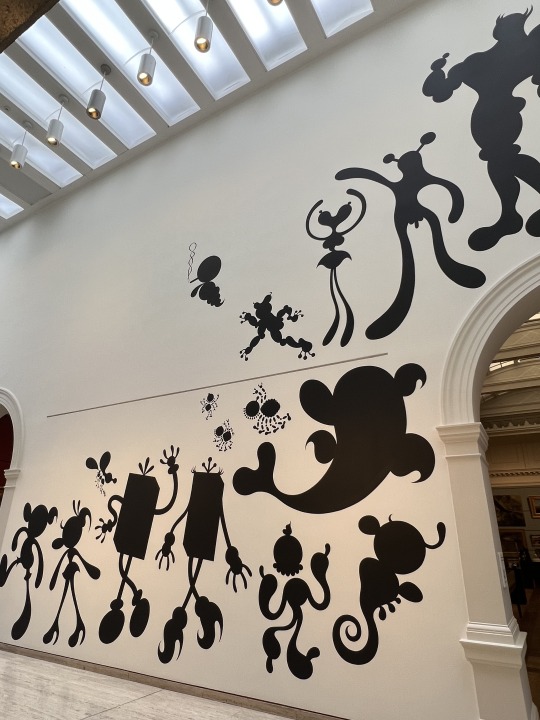
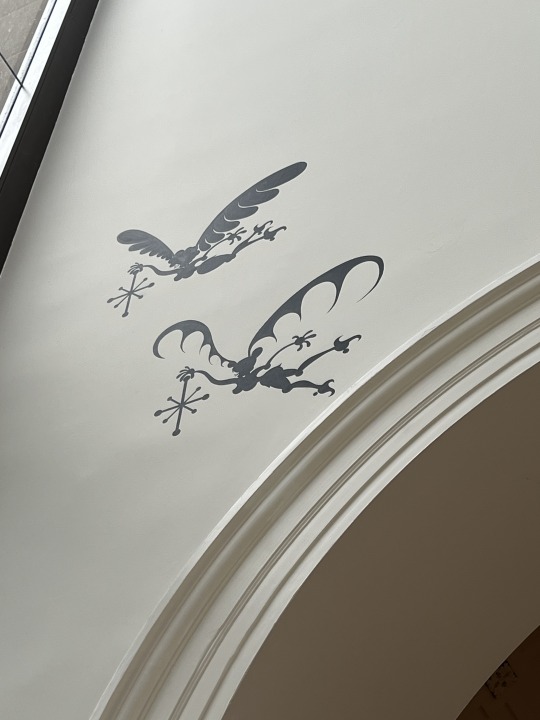
Description: "In Maru Yacco's Sydney parade, silhouetted figures appear like a troupe of dancers on a stage. Playing with ideas of hyper-masculinity and exaggerated femininity, the characters act as avatars. Yacco creates worlds full of whimsical, gender-fluid characters, informed by Japanese popular and subcultures. Often delving into ideas around genderless reproduction and alternative family structures, Yacco - a prominent figure in the Japanese trans community - challenges assumptions while reflecting on contemporary ideas of identity construction in the age of social media."
Robert Gabris' The Garden of Catastrophe series (pencil on paper)
From left to right: Becoming an Insect (2023), Deadly Nightshade (2023), In the Garden of Catastrophe (2023)
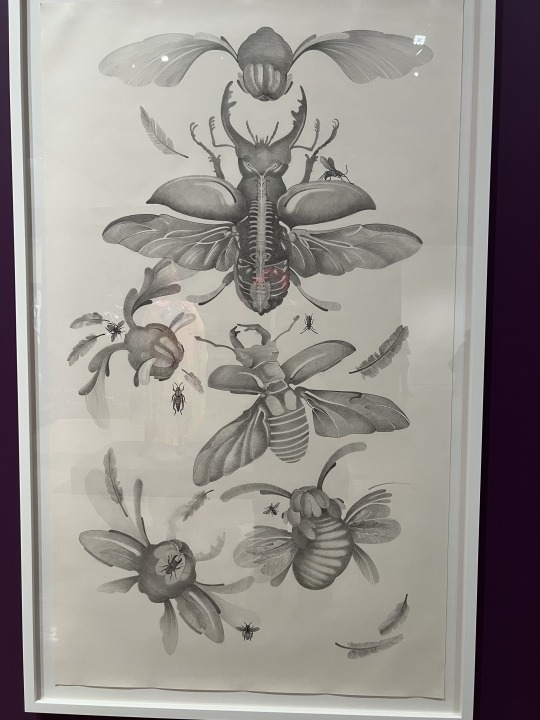
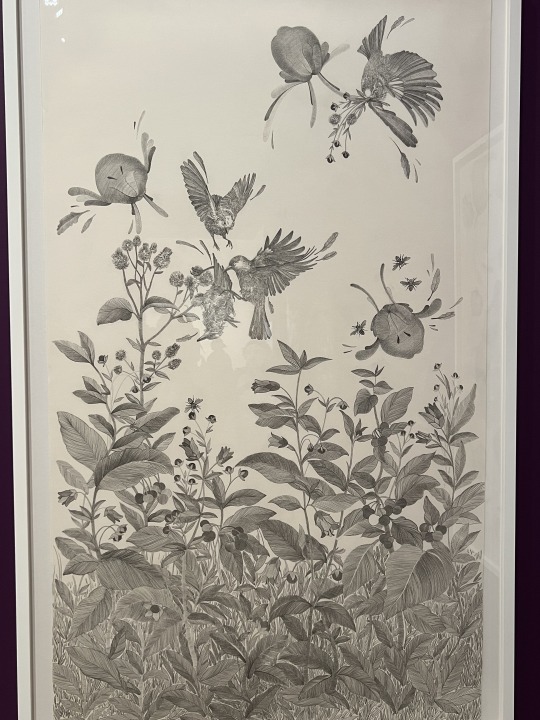
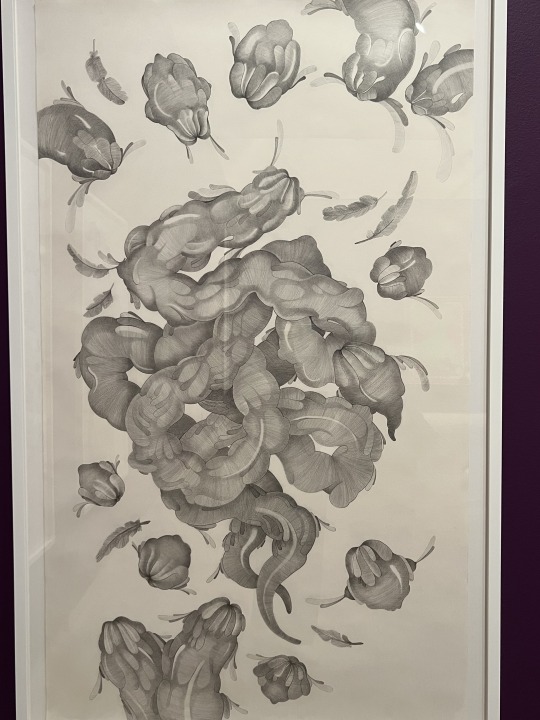
Description: "The series The Garden of Catastrophy is an expression of empowerment, symbolising the reclamation of agency over one's own narrative and identity. Each drawing challenges centuries of racism, discrimination and exoticisation experienced by the Roma people throughout Europe to this day. Pressing against heteronormative assumptions, Robert Gabris' drawings present a free-flowing identity more accepted within Roma culture. This self-described chaos isn't a force of destruction, but rather an agent of transformation and rebirth - a metaphor for the ever-evolving identities and stories of the marginalised. Central to Gabris' work is a critique of the Eurocentric anthropological discourse that has historically objectified and dehumanised Roma bodies. Through the fragmented portrayal of the queer Roma body, the drawings depict a garden of healing wherein the 'other' grows prodigiously. Symbolising ancestral wisdom, the insects that populate the garden navigate adversity with tenacity, just as the Roma people have endured the trials of history and colonisation."
Iratxe Jaio and Klaas Van Gorkum's False Flag (2021-2023, sculptural installation - polystyrene, fibreglass, epoxy resin and lacquer - and short film (5 mins 49 secs))
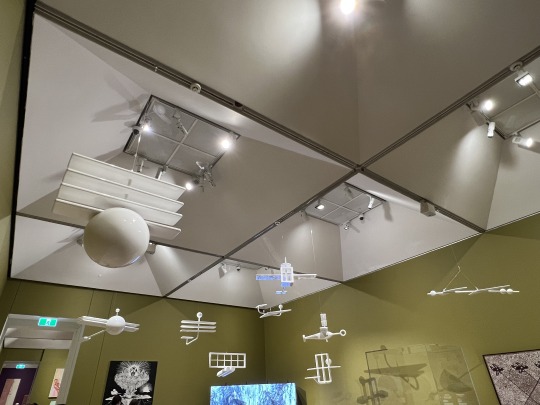






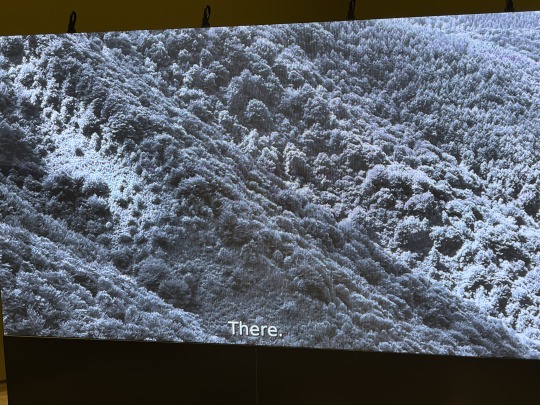
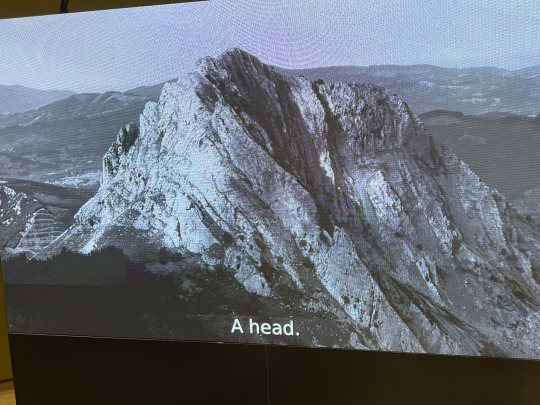


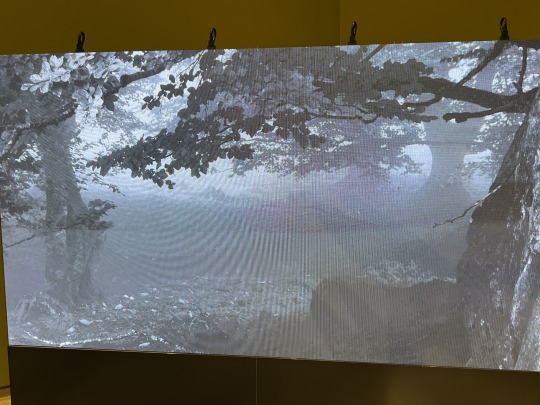
Description: "Taking inspiration from René Magritte's 1937 painting Le drapeau noir ('The black flag'), a response to the bombing of the Basque town of Guernica during the Spanish Civil War, Irate Jaio and Klaas van Gorkum have re-created in 3D several of the work's futuristic airplanes. Appearing as if props from a science-fiction film, the planes foreshadow the advent of drone warfare and satellite technology that define the contemporary era. Gesturing at the ways in which technology fundamentally skews human relationships with geography, Jaio and van Gorkum's False Flag is backgrounded by footage of the Basque mountains, and layered with ghostly and disparate voices listing body parts depicted in Pablo Picasso's Guernica 1937. Blurring ideas of the present, past and predictions for the future, False Flag considers how time and distance alter historical memory."
Bonita Ely's loctus works
Row 1: At home with the Locust People (Itchy feet) (1974-1975, oil paint and collage on canvas), At home with the Locust People (1974, acrylic paint on canvas)
Row 2: c20th Mythological Beasts: At home with the Locust People (1975, mixed media installation and short film (19 mins))
(Mild content warning for some censored artistic nudity)
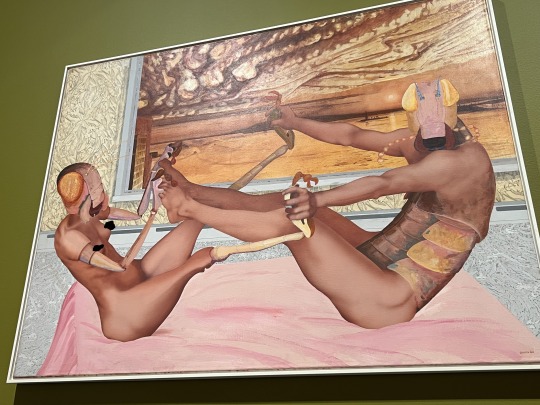
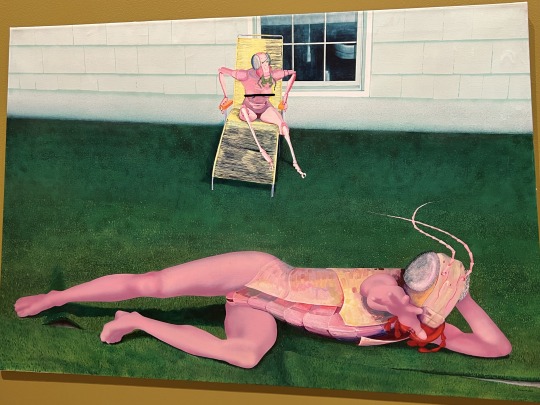


Description: "From the deserts of Ancient Egypt and the outcroppings of North America's Rocky Mountains to Australia's drought-ridden plains, locust swarms have devastated harvests, communities and entire landscapes. This biblical phenomenon - a sign of great punishment or the end of times - is scientifically referred to as the 'gregarious phase' whereby solitary locusts congregate in heaving, mass-producing and ravenous swarms. For Bonita Ely, who explores themes of environmental degradation in her art, there is an apt correlation between the gregarious phase of locusts and the relationship humans have with the natural world. Created in the 1970s when questions surrounding population and pollution were reaching a fever pitch, the 'Locust People' works depict modern domestic scenes populated by vulgar human-insect hybrids. In each, the Locust People have left their surroundings either bare or smouldering, yet remain unbothered by anything except one another. Ely's grim prediction of future environmental collapse positions humans as both the victim and the perpetrator. In c20th Mythological Beasts: At home with the Locust People, a nuclear family reclines, unfazed, while watching scenes of a dying world on television. Like a locust swarm, humanity will not stop until there is nothing left to consume."
Nádia Taquary's beaded headdresses EG03 (yellow - 2021, Ipe wood, 70-degree bronze, fabric, and African cowrie shells) and EG05 (red/purple - 2021, Ipe wood, 70-degree bronze, glass beads imported from Czech Republic, Nigerian amber, and gourds)

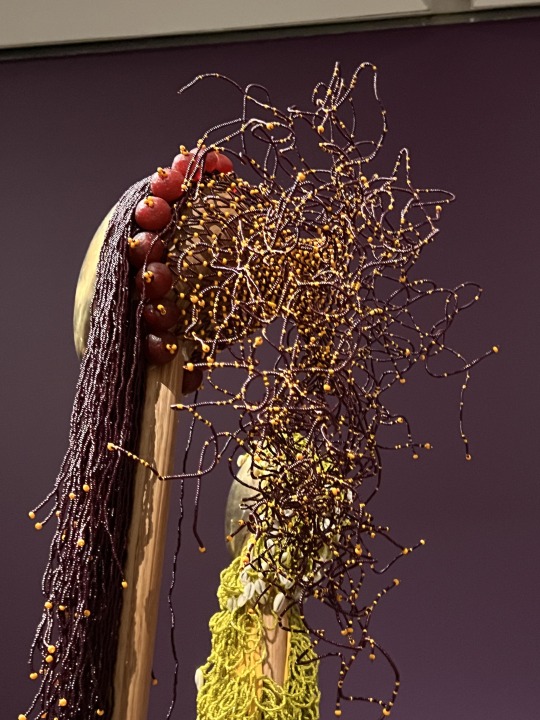
More info (not from Biennale description):
Pauline and Jim Yearbury's carved Rimu wood (c. 1967-1975)
From left to right: Tu Matauenga, Tawhirimatea, Rongo Mare Roa, Warrior Slaying Taniwha, How Maui Made The Sun Slow Down, Hinemoa & Tutanekai
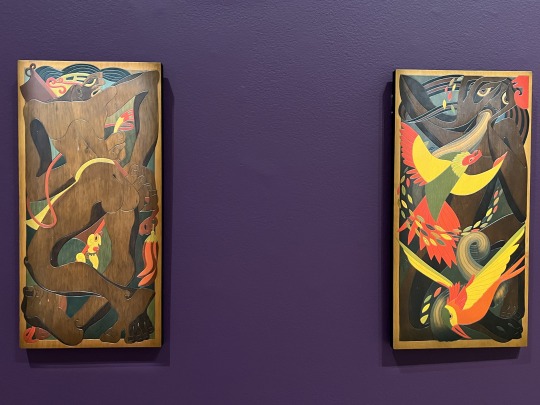


Description: "An important practitioner in Maori modernist art, Pauline Yearbury was dedicated to the preservation of ancestral knowledge. In 1943, she became one of the first two Mãori women to study at Elam School of Fine Art, Auckland, and would go on to spend much of her career tutoring younger artists. In collaboration with her husband Jim Yearbury, Pauline Yearbury created incised Rimu wood panels detailing the swirling stories which constitute a rich Mãori mythology, the back of each labelled with a description of the scene it depicts. From tales of love and war to the movement of the sun, Yearbury has captured the intricacies of her culture by combining traditional Mäori carving with her geometricised forms."
0 notes